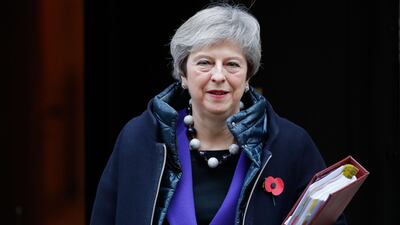British prime minister Theresa May struck a tentative deal with the European Union on Thursday that would give British companies continued access to the bloc's market after Brexit.
The services deal would give British financial services companies the ability to continue operations in Europe according to the principle of "equivalence", by which Brussels recognises that post-Brexit British regulations – albeit potentially different – will align with those in the EU.
Dominic Raab, the Brexit secretary said in a letter to the Commons Brexit committee published Wednesday that this is a sign that a wider deal is close to being finalised – which the government expects will happen within three weeks, The Times reported.
The border issue with Ireland was still a matter of "concern", but Raab added that "despite our difference we are not that far from an agreement on this issue. The end is firmly in sight."
_____________________
Read more:
Britain’s chancellor says austerity is ‘coming to an end’ in last budget before Brexit
UK's new Brexit 50p leaves Britons less than enthusiastic
_____________________
Under the new deal, "equivalence", the EU and the UK would be able to change or set new financial regulations after consulting each other beforehand, it was reported. The tentative agreement touches upon all aspects of a future partnership on services, including the exchange of data.
The pound jumped as much as half a percentage point against the dollar following the news.
Britain is due to leave the EU in five months and businesses are demanding certainty over the new set of regulations. Many Global banks have begun to move operations to European hubs in order to continue to serve this market if Britain leaves the bloc without a deal.
A no-deal Brexit would mean a difference of 1.6 percentage points to UK growth next year.
If Britain leaves the European Union without an agreement, reverting to World Trade Organisation's most-favoured-nation status rules, the UK's gross domestic product would increase only 0.3 per cent in 2019, according to the National Institute of Economic and Social Research (Niesr).
A trade accord that preserves most of the current arrangements would instead mean the economy will grow 1.9 per cent next year, more than the think tank's previous forecast of 1.7 per cent.

